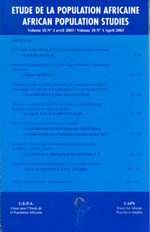
|
African Population Studies
Union for African Population Studies
ISSN: 0850-5780
Vol. 33, No. 1, 2019, pp. 4750-4765
|
 Bioline Code: ep19012
Bioline Code: ep19012
Full paper language: French
Document type: Research Article
Document available free of charge
|
|
|
African Population Studies, Vol. 33, No. 1, 2019, pp. 4750-4765
| fr |
Genre et attitudes de stigmatisation à l’égard des Personnes vivant avec le VIH (PVVIH) au Bénin
Alphonse, Affo Mingnimon; Robert, Djogbenou Yao; Pacôme, Acotcheou & Rigobert, Tossou Cocou
Résumé
Contexte : Les attitudes de rejet des PVVIH constituent un frein à l’accès universel et à leurs droits essentiels. Cet article vise à apporter un éclairage sur les disparités de genre en matière de stigmatisation des PVVIH.
Méthodologie : Analyse secondaire des données de l’EDSB 2011-2012. Un indicateur de niveau de stigmatisation a été créé pour faire des analyses multi-variées de régression logistique sur un échantillon de 4813 hommes et 14849 femmes.
Résultats : Pour les deux sexes, avoir un niveau élevé d’instruction, être exposé fréquemment aux médias, être chrétien et appartenir au groupe ethnique Adja déterminent l’attitude bienveillante envers les PVVIH. Il en est de même pour les femmes qui sont en union conjugale, celles qui vivent en milieu rural, celles vivant dans des ménages riches ou celles n’ayant aucune activité économique.
Conclusion: Développer des stratégies de protection des PVVIH en s’appuyant sur les attitudes bienveillantes observées.
Mots Clés
stigmatisation; genre; VIH/Sida; Bénin
|
| |
| en |
Alphonse, Affo Mingnimon; Robert, Djogbenou Yao; Pacôme, Acotcheou & Rigobert, Tossou Cocou
Abstract
Background: The rejectionist attitudes of PLHIV are a barrier to universal access and their basic rights. This article aims to shed light on gender disparities in the stigmatization of PLHIV.
Methodology: Secondary analysis of the 2011-2012 EDSB data. A stigma level indicator was created to perform multi-varied logistic regression analyzes on a sample of 4813 men and 14849 women.
Results: For both sexes, having a high level of education, being exposed frequently to the media, being a Christian and belonging to the Adja ethnic group determine the caring attitude towards PLHIV. It is the same for women who are in a conjugal relationship, those who live in rural areas, those who live in wealthy households or those who have no economic activity.
Conclusions: Develop protective strategies for PLHIV based on the caring attitudes observed.
Keywords
stigma; gender; HIV / AIDS; Benin
|
| |
© Copyright [2019] - African Population Studies
Alternative site location: http://www.uaps-uepa.org
|
|
